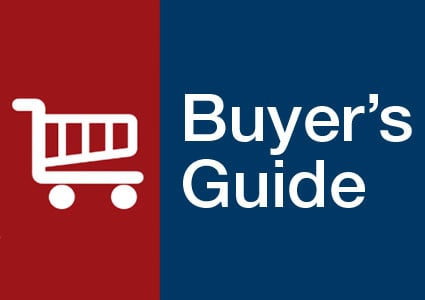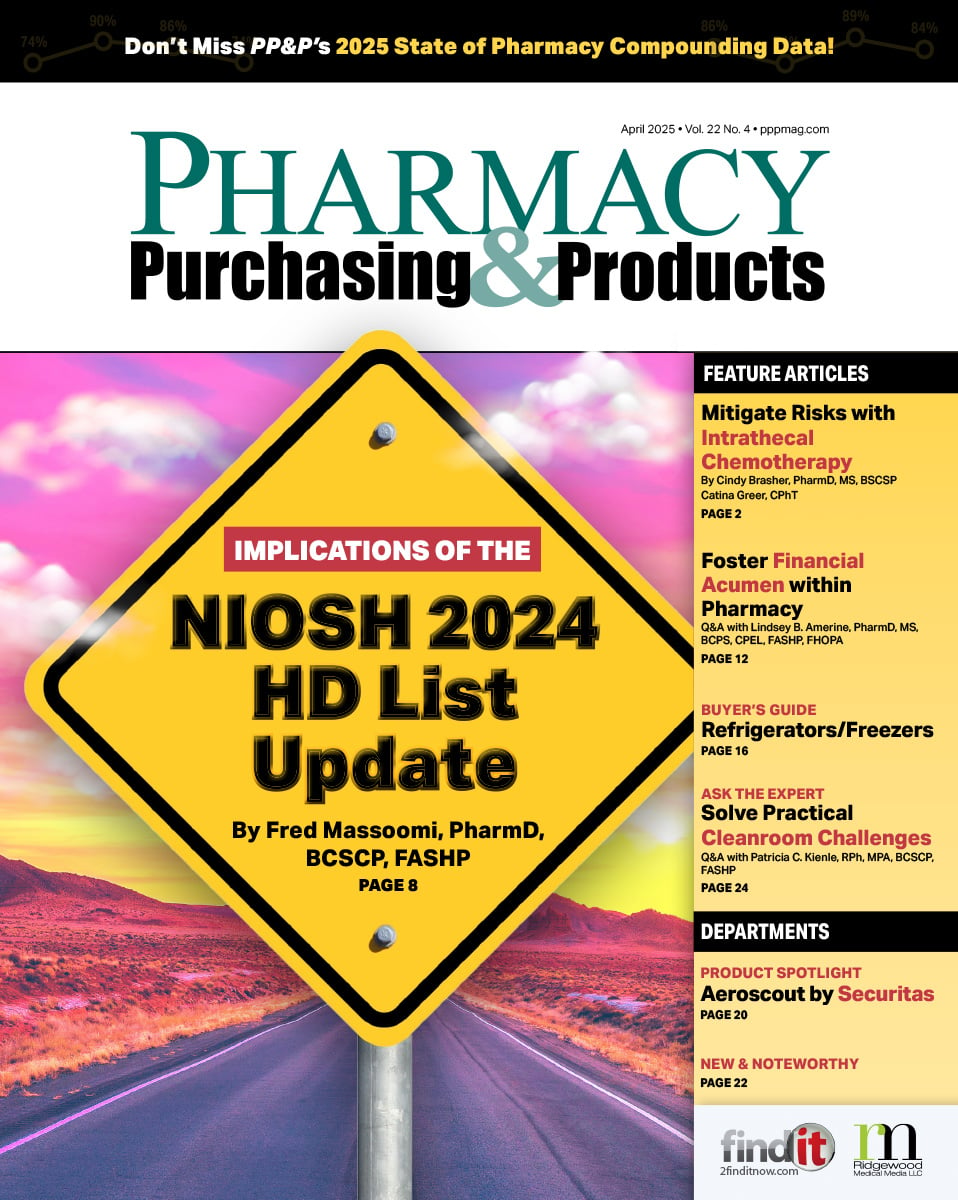- Show Menu
- Contact Us
- FAQs
- Reader Service
- Survey Data
- Survey Winners
- Testimonials
- Upcoming Events
- Webinars
- White Papers
Outsourced TPN Compounding
Safe, efficient compounding can be challenging for facilities working to comply with USP General Chapter <797> requirements on a limited budget. With the 2008 revisions to the chapter, many hospitals found that their facilities do not meet all of the standards now in place for compounding in-house. According to Pharmacy Purchasing & Products’ 2011 State of Pharmacy Compounding survey, two-thirds of all facilities outsource at least some of their sterile compounding, and 34% of these are outsourcing total parenteral nutrition (TPN).1 As the numbers of vitamin and electrolyte shortages continue to increase each year, more and more facilities are turning to outsourced admixture pharmacy services to fulfill their TPN needs.
Two years ago, the Massachusetts Department of Public Health Division of Health Care Quality initiated an unannounced infectious disease control survey at our facility, the 127-bed Merrimack Valley Hospital in Haverhill, Massachusetts. As a result of this survey, we knew we were not in compliance with the most recent USP <797> standards for sterile compounding of TPNs. Thus, we began to search for a solution that would provide us with the volume of TPNs needed on a daily basis—within our budget constraints—while satisfying USP <797> requirements.
Impediments to Compliance
Prior to the infection control survey, all of our compounding was done in a laminar flow hood or vertical chemotherapy hood. Although the hood was compliant with <797> standards and inspected every six months, the preparation area around the hood where compounding was taking place was not: the ceiling tiles were not solid or smooth, the paint was unable to be cleaned properly in a cleanroom, and we lacked the appropriate ante room area.
Because Merrimack Valley Hospital’s pharmacy does not operate 24 hours, seven days a week, compounding TPNs in accordance with <797> standards remained problematic despite our relatively low volume of two or three TPN solutions daily. TPNs are considered medium risk due to the number of aseptic manipulations and multiple ingredient additions. The infection control survey only allowed two punctures of an IV medication solution in order to maintain compliance with the standard. In addition, the expiration time could not exceed 12 hours from the time the IV solution was prepared. As a result, a great deal of waste was generated when we were unable to administer within the allocated time frame.
Our initial plan to gain compliance was to build a cleanroom, but when we attempted to secure financing for the project, we found the capital was not available in the budget at that time. Therefore, we began searching for an outsourced compounding service that could supply us with the quantity of TPNs we required and deliver them on-demand on a daily basis to meet our current delivery time. We had been outsourcing certain hard-to-find medications—as well as some products that were not available commercially, such as specialized chemotherapy—for about five years, but that vendor did not focus on TPNs. One of the main goals in choosing an outsourcing vendor for TPNs was to find one that had performed the necessary sterility testing to offer extended dating beyond the 12-hour time frame.
Choosing an Outsourced Compounder
When considering which outsourced compounding vendor best suits your facility’s needs, consider both overall price and whether the vendor can provide the types of medications and volumes you require, as well as their compliance to <797> standards for sterile compounding. For example, ensure that they are keeping logs of the room temperature where the compounding is taking place, that the surfaces in the IV room are flat and able to be wiped down, the walls are clean and have no contaminants, and that the cleaning products used only apply to the cleanroom area. No food or drink should be allowed in the cleanroom. Scrubs and coats must be cleaned on a regular basis and there must be a policy in place for proper gowning technique when moving from room to room. It is not uncommon to see improperly trained staff leaving the cleanroom with their foot covers on to go outside, and then tracking in grass particles and other contaminants upon reentry.
Thoroughly investigate the vendor to ensure they are taking all required precautions and that compounding is taking place in a pristine environment. The facility should perform regular inspections as well as random spot checks to ensure good practices are being consistently followed.
Include Appropriate Decision-makers
When evaluating a potential vendor, involve the appropriate decision-makers in your facility, including the pharmacy director, C-suite members, the chair of the P&T committee, legal counsel, physicians, and any relevant committees. Your organization should consider grading each potential vendor using an appropriately weighted rating system. ASHP has published guidelines on outsourcing sterile compounded services and evaluating vendors’ performance (available at: http://www.ashp.org/DocLibrary/BestPractices/MgmtGdlOutsourcingSterileComp.aspx).
Evaluate Quality with a Site Visit
Visiting the site where the compounding will take place is especially important to accurately evaluate the quality of a potential outsourced compounding vendor. After we identified the vendor that best fit our hospital’s needs, we toured their facility to verify safety standards and policies and procedures. It is important to investigate sterility testing procedures and beyond-use dating studies and visit cleanrooms and the microbiology lab to determine the vendor’s compliance with <797> requirements. Quality checks should be built into the procedure when products come in, are compounded, and before they are shipped.
Making an unannounced site visit also can be valuable to see the vendor’s procedures in action when they are not expecting a visit, but this may be difficult to coordinate due to most compounders’ strict security standards. Permission is required to enter the vendor’s facility, as it is, understandably, a closed system.
Taking Advantage of Beyond-Use Dating
One year ago we chose our TPN vendor and contracted with them to provide all of our facility’s TPNs. The benefits of outsourcing sterile IV preparation will vary considering a facility’s needs and how well the chosen vendor can fulfill them. Among the many reasons facilities may turn to outsourcing—streamlining workflow, gaining regulatory compliance, reducing waste through beyond-use dating, reducing the number of compounding errors, simplifying record keeping, and reallocating staff to patient-centered tasks—our primary reasons for outsourcing were to take advantage of increased beyond-use dating and to come into regulatory compliance with <797>.
Merrimack Valley Hospital’s previous process of compounding TPNs in-house in a hood was problematic, and because more than two items needed to be mixed, the resulting TPNs could only be used for up to 12 hours. Our chosen outsourced vendor has performed stability tests and has data to support 24-hour beyond-use dating, significantly improving the shelf life of our outsourced TPNs. Furthermore, each batch produced is tested to ensure safety.
In addition, as a smaller hospital without a third pharmacy shift, our staffing model was insufficient to produce compounded products on a large scale, as is occasionally required; we are not able to depend on third-shift employees to catch up with the next day’s TPN requirements. Because our outsourced vendor makes TPNs on demand each day, we are able to provide them consistently and in a timely manner.
Financial and Quality Considerations
Outsourcing our sterile IV medications does cost more than purchasing the individual components and compounding in-house, but these costs are offset by the convenience of the services provided, the discounts our GPO is able to obtain through corporate contracts, and the confidence we have in the quality and safety of the products. Because we would have needed to build a cleanroom to become <797>-compliant—which would have been significantly more expensive than contracting with an outsourcer—the choice to outsource was easily made.
The goals we hoped to achieve through outsourcing our TPN compounding—namely, achieving <797> compliance and benefitting from beyond-use dating—were realized shortly after we transitioned to the outsourced compounding model. We continue to evaluate additional methods of reducing waste and ensuring the safety and sterility of our sterile IV products.
Reference
- Outsourced Compounding. The 3rd Annual State of Pharmacy Compounding: Results from PP&P’s 2011 National Survey. Pharmacy Purchasing & Products. 2011;8(4):S30-S31.
 Lori Lotterman, RPh, MPH, is the director of pharmacy at Merrimack Valley Hospital in Haverhill, Massachusetts, a Steward Family Hospital. She received a BS in pharmacy from Northeastern University, a masters in public health from Boston University, and completed the ASHP Pharmacy Leadership Institute. Ms. Lotterman can be reached at lori.lotterman@steward.org.
Lori Lotterman, RPh, MPH, is the director of pharmacy at Merrimack Valley Hospital in Haverhill, Massachusetts, a Steward Family Hospital. She received a BS in pharmacy from Northeastern University, a masters in public health from Boston University, and completed the ASHP Pharmacy Leadership Institute. Ms. Lotterman can be reached at lori.lotterman@steward.org.
Drug Availability during Shortages
Outsourcing sterile IV products has modestly improved the availability of short-dated drugs on shortage. If a shortage is suspected, purchase up to your maximum par level. At that point, any remaining available medications may need to be allocated to the most critical hospital areas first. In some instances, a second-line drug may need to be substituted for a first-line medication. For example, during the propofol shortage last year we had to substitute fentanyl and midazolam to sedate endoscopy patients for procedures. In another instance we could not access a certain antibiotic, but a nearby hospital was able to lend us enough to outlast the shortage.
Like what you've read? Please log in or create a free account to enjoy more of what www.pppmag.com has to offer.








